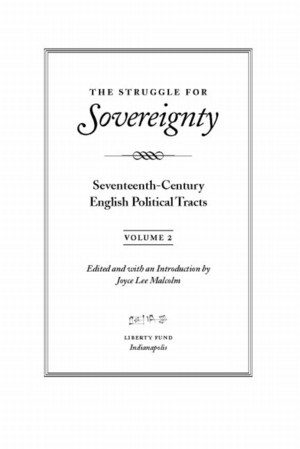
Part of: The Struggle for Sovereignty, 2 vols. The Struggle for Sovereignty: Seventeenth-Century English Political Tracts, vol. 2
- Joyce Lee Malcolm (editor)
The political tracts of the English peoples in the seventeenth century established principles of governance and of liberty that benefited not only themselves but the founders of the American republic. These writings, by the renowned (Coke, Sidney, Shaftesbury) and the unremembered constitute an enduring contribution to the historical record of the rise of ordered liberty.
Key Quotes
Presidents, Kings, Tyrants, & Despots
“I, A. B. do declare that it is not Lawful upon any pretence whatsoever, to take up Armes against the King, and that I do abhorr that Traiterous position of taking Armes by His authority, against His Person, or against those that are commissioned by Him in pursuance of such Commission; And I do…